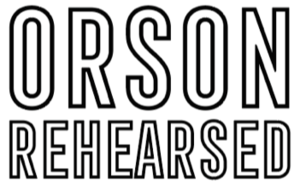THIS WEBSITE
…is home for:
revivals and reinterpretations of the staged iteration(s) of the operafilm (premiered in September 2018, with revivals ongoing)
the live recording on Naxos Records (released in April 2021)
the operafilm by Daron Hagen (released June 2021)
an archive of interviews, reviews, articles, and media feeds
an online “memory palace” of images (filmic “beats”) that appear in the operafilm, the staged version (continually evolving web installation)
Poster design: Chris Lyons Illustration
“Orson Rehearsed represents the filmmaking debut of Daron Hagen, who wrote the libretto/script and score (both acoustic and electro-acoustic), stage (and film) directed, shot the film for the movies-within-the-film and staged opera, wrote the screenplay, edited the film, and mixed the soundtrack.”
THE OPERAFILM
The operafilm Orson Rehearsed is the psychological, emotional, and spiritual journey taken by the American actor, polymath, and creator of Citizen Kane Orson Welles, as he finds himself on the threshold between life and death. Memories of Welles as a wunderkind and in his swashbuckling prime are brought to life, as well as successes and failures both real and imagined, with the consolation of a life fully lived. Fusing live players with pre-recorded sounds and effects, the film version of Orson Rehearsed has been a multiple award-winner at festivals in the US, Europe and beyond.
THE STORY
Orson Welles' heart has just stopped. We enter his mind in this moment, on the threshold between life and death.
In the bardo Orson’s thoughts unspool as a stream of consciousness that loops back on itself, like a Möbius strip. Those thoughts are articulated by three avatars: the first (Omar Mulero) represents the past, the memory of his youthful wunderkind self; the second (Robert Frankenberry) represents Welles’ vestigial self-image as a swashbuckling mid-career artist, bemused to find himself crumpled on the floor in his bathrobe, dying; the last (Robert Orth), represents Welles’ spirit, “out of time”—what Heidegger called an “ecstace.”
We sit beside Welles as he weighs his life and gradually comes to terms with his own death. The 60-minute narrative arc is a psychological, emotional, and spiritual one that begins in the echoes of his heart’s final beats and ends with the sound of his footsteps as he makes his existential exit. We hear what he hears, and, in the filmed and staged versions of Orson Rehearsed, we see what he sees—three sixty-minute films counterpoint the onstage and filmic action of his avatars’ monologues. The final result is Orson Rehearsed, a film within a staged opera within the film called Orson Rehearsed taking place within Orson Welles’ dying mind.
On its face, the piece consists of a series of essays about how opera and film overlap. Digging deeper, it examines the relationship between an actor and the roles he inhabits—Falstaff, Othello, Brutus, Ahab, Kane, Quinlin, and, in his “greatest prestidigitation,” himself.
Deeper still, it is a survey of the real and imagined failures of Welles’ life: from the loss of his mother at the age of eight to the accidental drowning of Manuel “Jacaré” Olimpio Meira during the filming of It’s All True; the pain of his repeated loss of creative control in the editing of Magnificent Ambersons, Touch of Evil; his humiliation in "starting at the top” with Citizen Kane and ending up earning “grocery money” doing wine commercials.
Deeper still, there is the consolation of a life fully lived—the giddy joy of careening across Manhattan in a rented ambulance (to better cut through traffic) at the top of his game on his way to the War of the Worlds radio broadcast, the tender recollection of his wife Rita Hayworth, and fatherhood.
A passionate social activist, Welles’ last thoughts are of the future: with the foresight available only to the dead, he mourns his country as the words of a xenophobic reality television president are intercut with Emma Lazarus’ paeon to liberty. But the body gives out even though the spirit’s still willing: it is no longer Welles’ problem, it is ours. His avatars join together in a secular hymn: "Our songs will all be silenced,” they sing, “but what of it? Go on singing. Go on. Go.” And he does. We do.
